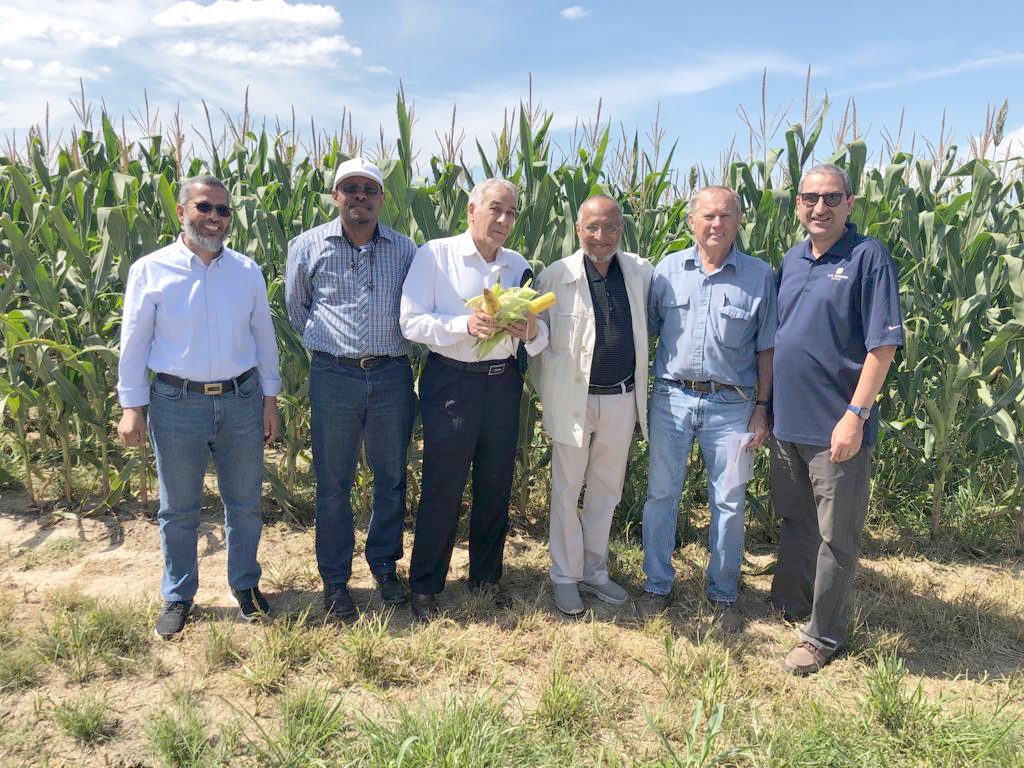Imports represent a growing proportion of animal feed rations in Saudi Arabia due to shifting government policies to conserve water and increased overall demand. The U.S. Grains Council (USGC) is working with leading feed grain importers and end-users to capture that demand and expand export opportunities for U.S. feed grains and co-products to the Kingdom.
“The Council foresees the Kingdom to be a key export market for U.S. feed grains and co-products, as well as a growing export market for ethanol for years to come – especially as Saudi continues to turn to imports to conserve water and meet growing feed grain demand,” said Ramy Taieb, USGC regional director for the Middle East and Africa.
A critical component of the Council’s work with Saudi industry is ensuring key decision makers have a comprehensive understanding of U.S. grain production, marketing and handling systems. As a part of this effort, the Council organized a team from ARASCO, Saudi Arabia’s largest feed milling company, to travel to the United States in July to meet with U.S. producers, suppliers and exporters.
“Customizing programs to meet the specific needs of an individual company, such as ARASCO, ensures the Council’s programs address the specific interests and concerns companies may have regarding U.S. feed grains and co-products,” Taieb said. “With a 40 percent market share in the feed industry and plans to expand its operations, ARASCO is, and will continue to be, a key partner to the Council in the region.”
The team visited Illinois, Kansas and Louisiana to gain a better understanding of the U.S. feed grains and co-products value chain – from production to logistics channels for export – as well as the nutritional and economic advantages of these commodities.
“Teams like this one allow the Council to provide consistent, reliable market information to the Saudi feed industry,” Taieb said. “The direct interaction between Saudi buyers and U.S. farmers and exporters is an integral part of assessing and evaluating what tools the Saudi industry needs to use higher volumes of U.S. feed grains and co-products.”
The Council has worked in Saudi Arabia for more than three decades, focusing on relationship building, market promotion and knowledge exchange. The amendment to the Saudi’s animal feed subsidies in 2011 – which the Council encouraged – granted import subsidies for U.S. distiller’s dried grains with solubles (DDGS) and corn gluten feed for the first time.
“This allowance created new export market opportunities for U.S. corn and co-products to the Kingdom,” Taieb said. “One of the world’s driest areas, Saudi Arabia also began undertaking substantial measures in 2016 to conserve water, creating additional demand for imported feed versus heavily-irrigated domestic barley and wheat production.”
As a result of these policy revisions and growing feed grain demand, the Kingdom has grown into a key export market for U.S. corn, sorghum and co-products. Saudi Arabia purchased nearly 1.5 million metric tons (59 million bushels) of U.S. corn, ranking as the ninth largest market, in addition to U.S. DDGS and corn gluten feed in the 2017/2018 marketing year.
Saudi customers, including ARASCO, were also among the first to purchase U.S. sorghum vessels on the water when China announced tariffs in April 2018. Since that announcement, the Saudi Arabian market overall has purchased 280,000 tons (11 million bushels) of U.S. sorghum.
The Council will continue working with Saudi buyers and end-users to meet their feed demand as additional water-conservation policies are put in place – including one introduced in early 2019 to reduce overall water consumption by 24 percent over the next year.
“The Council has the opportunity to further increase its effectiveness in the Saudi market by providing marketing information to major players in the Saudi feed industry,” Taieb said. “Doing so will continue to improve import prospects for U.S. corn, sorghum and co-products to the Kingdom.”
About The U.S. Grains Council
The U.S. Grains Council develops export markets for U.S. barley, corn, sorghum and related products including distiller’s dried grains with solubles (DDGS) and ethanol. With full-time presence in 28 locations, the Council operates programs in more than 50 countries and the European Union. The Council believes exports are vital to global economic development and to U.S. agriculture’s profitability. Detailed information about the Council and its programs is online at www.grains.org.

